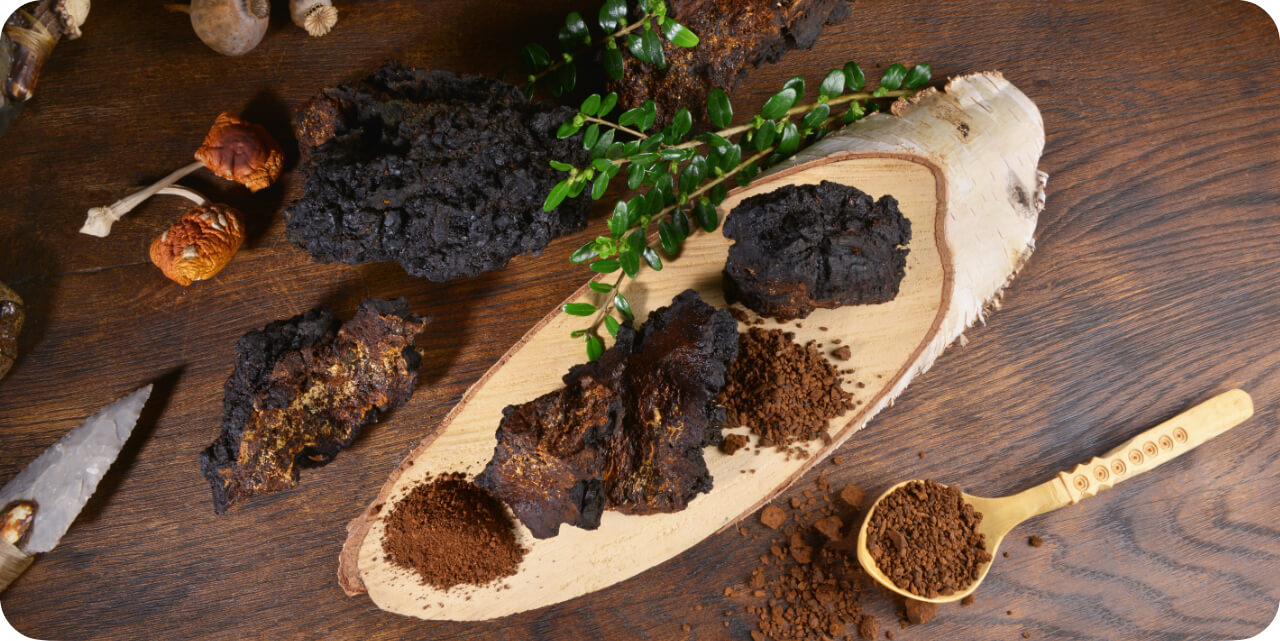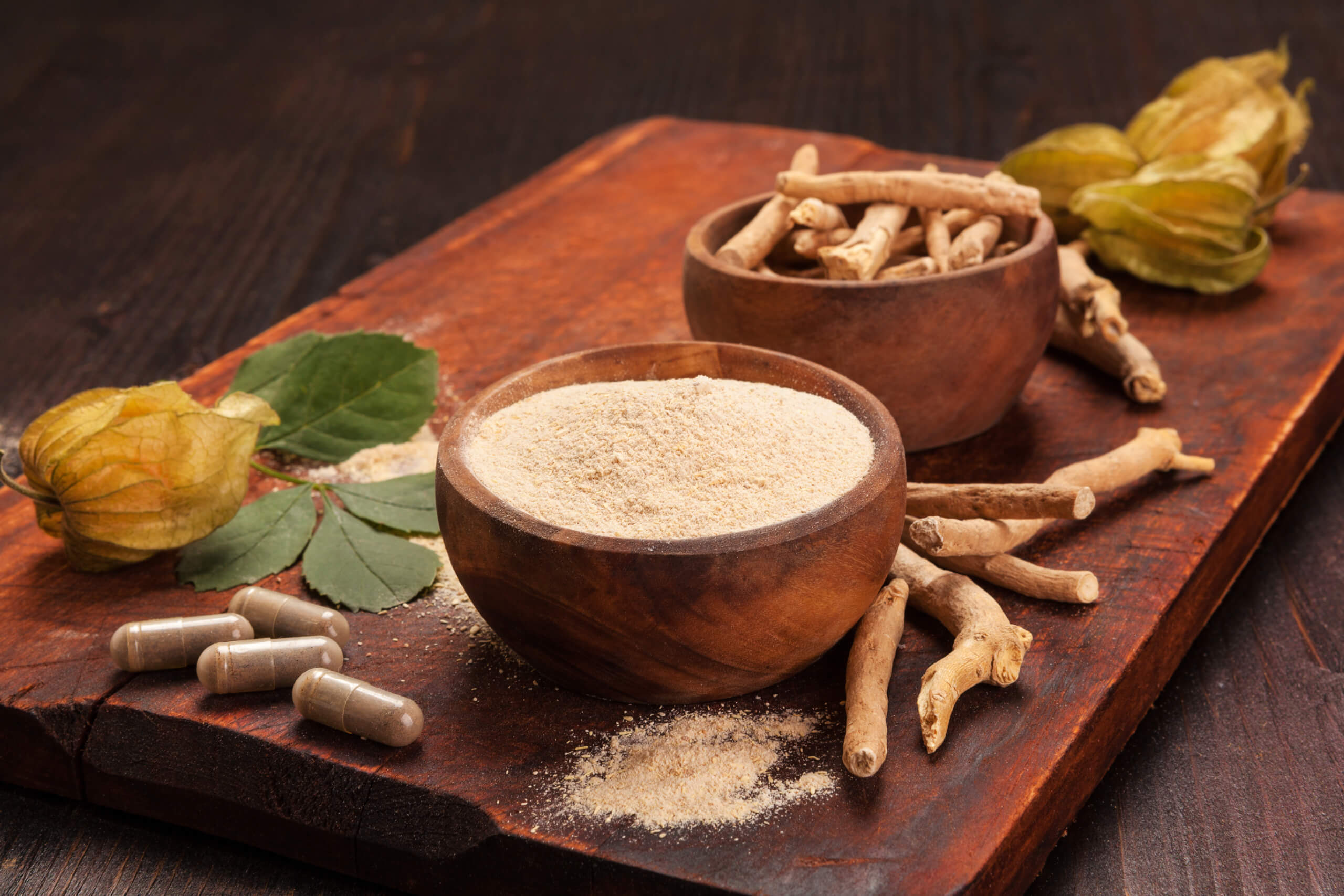Introduction
Chaga, a type of medicinal mushroom, has been revered for centuries for its health benefits. Found primarily on birch trees in cold climates, Chaga is now gaining popularity in the wellness community. This article explores the nutritional profile, health benefits, and potential side effects of Chaga, providing a comprehensive guide for anyone interested in this extraordinary fungus. Plus, we’ll introduce Shroomio, a supplement that combines Chaga with other powerful mushrooms.
What is Chaga?
Origins and History
Chaga (Inonotus obliquus) is a parasitic fungus that primarily grows on birch trees in the Northern Hemisphere, particularly in Russia, Siberia, and parts of North America. Traditionally used in folk medicine, Chaga has been utilized for its purported ability to enhance health and longevity.
Traditional Uses
Historically, Chaga has been used to treat a variety of ailments, including gastrointestinal issues, tuberculosis, and heart disease. Indigenous Siberians even refer to it as the “Gift from God” due to its extensive medicinal properties.
Nutritional Profile of Chaga
Chaga is a nutrient-dense mushroom packed with vitamins, minerals, and other beneficial compounds. Here’s a look at its nutritional content:
| Nutrient | Quantity (per 100g) |
|---|---|
| Fiber | 20g |
| Vitamin D | 600 IU |
| Potassium | 1200 mg |
| Zinc | 2 mg |
| Iron | 5 mg |
Chaga also contains numerous polysaccharides, polyphenols, and triterpenoids, which contribute to its health benefits.
Health Benefits of Chaga
Boosts Immune System
Chaga is known for its immune-boosting properties. Studies suggest that it can enhance the production of cytokines, which are proteins that regulate the immune response, helping the body to fight off infections more effectively.
Anti-Inflammatory Properties
The anti-inflammatory effects of Chaga are well-documented. Its compounds can reduce inflammation by inhibiting the production of pro-inflammatory cytokines, making it beneficial for conditions like arthritis.
Antioxidant Effects
Chaga is rich in antioxidants, particularly superoxide dismutase (SOD), which helps to protect cells from oxidative stress. Its ORAC (Oxygen Radical Absorbance Capacity) value is one of the highest among natural foods, outpacing other renowned antioxidants.
Supports Heart Health
Research indicates that Chaga can help lower cholesterol levels and reduce blood pressure, contributing to overall cardiovascular health. Its anti-inflammatory and antioxidant properties also play a role in protecting the heart.
Enhances Digestive Health
Chaga supports gut health by promoting a healthy balance of gut bacteria. Its prebiotic fibers nourish beneficial bacteria, aiding in digestion and overall gastrointestinal health.
Chaga and Cancer Prevention
Some studies suggest that Chaga may have anti-cancer properties. It contains betulinic acid, which has been shown to induce apoptosis (cell death) in cancer cells. Additionally, Chaga’s high antioxidant content can help prevent DNA damage that leads to cancer.
How to Incorporate Chaga into Your Diet
Supplement Forms
Chaga is available in various supplement forms, including capsules, powders, and extracts. These can be easily added to your daily routine for a health boost.
Cooking with Chaga
You can also incorporate Chaga into your diet by using it in cooking. Chaga powder can be added to soups, stews, and smoothies, providing a nutritional boost without altering the flavor significantly.
Tea and Tinctures
Chaga tea and tinctures are popular ways to consume this mushroom. Steeping Chaga chunks or powder in hot water releases its beneficial compounds, making it a soothing and healthful beverage.
Shroomio: The Ultimate Mushroom Supplement
For those looking for a convenient way to enjoy the benefits of Chaga, Shroomio is an excellent choice. This supplement combines Chaga with other powerful mushrooms like Cordyceps, Reishi, and Lion’s Mane, creating a synergistic blend that enhances overall health and well-being. Check out Shroomio here.
Possible Side Effects of Chaga
While Chaga is generally safe, there are some potential side effects to be aware of:
Allergic Reactions
Some individuals may experience allergic reactions to Chaga. Symptoms can include skin rashes, itching, and swelling.
Interactions with Medications
Chaga can interact with certain medications, particularly those that affect blood sugar and blood clotting. It’s essential to consult with a healthcare provider before starting Chaga if you’re on medication.
Recommended Dosage
The appropriate dosage of Chaga varies depending on the form and individual needs. Generally, a daily dose of 1-2 grams of Chaga extract is considered safe and effective.
Chaga vs Other Medicinal Mushrooms
Reishi
Reishi is known for its calming effects and is often used to improve sleep and reduce stress. While both Chaga and Reishi have immune-boosting properties, Reishi is more commonly associated with mental health benefits.
Cordyceps
Cordyceps is famed for its energy-boosting properties. It enhances athletic performance and supports respiratory health, making it a popular choice for athletes.
Lion’s Mane
Lion’s Mane is renowned for its cognitive benefits. It supports brain health by promoting the growth of nerve cells, which can improve memory and focus.
Conclusion
Chaga is a remarkable mushroom with numerous health benefits, from boosting the immune system to fighting inflammation and oxidative stress. While it offers many advantages, it’s essential to be aware of potential side effects and interactions with medications. For a comprehensive health boost, consider incorporating Chaga into your diet through supplements like Shroomio, which combines the power of multiple medicinal mushrooms.
FAQs
What is the best way to consume Chaga?
Chaga can be consumed as a tea, in powdered form, or through supplements like capsules and extracts. Choose the form that best fits your lifestyle and dietary preferences.
Are there any long-term side effects of using Chaga?
Chaga is generally safe for long-term use. However, it’s essential to follow recommended dosages and consult with a healthcare provider if you have underlying health conditions.
Can Chaga help with chronic diseases?
Chaga’s anti-inflammatory and antioxidant properties can support overall health and may help manage chronic conditions, but it should not replace conventional treatments.
How does Chaga compare to other superfoods?
Chaga is exceptionally high in antioxidants and offers unique immune-boosting properties, making it a valuable addition to any superfood regimen.
Where can I buy high-quality Chaga supplements?
High-quality Chaga supplements are available from reputable health stores and online retailers. Shroomio is a great option that combines Chaga with other beneficial mushrooms.
Related Posts
29/12/2024
Alpha GPC: Unlocking Better Brain Performance
Alpha-Glycerylphosphorylcholine, commonly known as Alpha GPC, is a natural choline compound found in the brain. It's…
17/12/2024
The Power of N-Acetyl L-Tyrosine for Mental Clarity and Focus
Are you struggling to stay focused during demanding tasks or feeling mentally drained after a long day? N-Acetyl…
05/12/2024
The Future of Nootropics: Trends and Innovations in Cognitive Enhancement
In today’s fast-paced world, the desire to stay mentally sharp, focused, and productive has driven a surge in interest…
23/11/2024
Ashwagandha (KSM-66): Stress and Cognitive Benefits
Ashwagandha, a revered herb in Ayurvedic medicine, is known for its ability to reduce stress and enhance mental…
11/11/2024
What Are Nootropics and How Can They Boost Your Brain Power?
Nootropics, sometimes referred to as "smart drugs" or "brain boosters," have recently taken the wellness world by…
30/10/2024
How to Combat Brain Fog with Supplements and Lifestyle Changes?
Brain fog is a term that describes a state of mental confusion or lack of clarity. You might find it hard to focus,…
18/10/2024
The Top Nootropics for Reducing Stress and Anxiety
In today’s fast-paced world, many people struggle with stress and anxiety. Nootropics, also known as cognitive…
06/10/2024
Alpha GPC For Athletes – What You Need To Know
When it comes to boosting athletic performance, most athletes focus on physical training, nutrition, and perhaps some…
24/09/2024
Natural Ways to Improve Focus and Concentration
Maintaining focus and concentration in today’s fast-paced world can be challenging. Fortunately, there are several…









